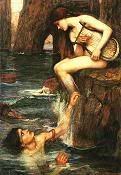In this poem, the main message is a commentary on our society where divorce is prevalent and how difficult it is for the people affected by the divorce to deal with it. In the beginning of the poem, the speaker appears to be a young child telling his/her experience with the divorce. The speaker is angry towards the father, "when mother divorced you, we were glad" (1). The "we" represents the family members who endured the same hardships the speaker did. The line "she took it and/ took it, in silence, all those years" (1-2) references to an act of abuse whether it be physical or verbal or even total silence. The poem later comments on the father's job which leaves the reader to believe that the father was possibly a workaholic and was never home to spend time with his family. The family is so bitter towards the father that when he was fired, "we grinned inside" (4-5). When the father was fired, Olds uses a simile to Nixon. Nixon, the father of the country at the time, and the father of the poem, both head of a nation and head of a household both had to leave due to the failure of fulfilling their duties. Another aspect that contributed to the father being a workaholic is the mention of his suits in line 11. The speaker only remembers her father's identity as being tied into the suits. It also means that it would be end to the years of silence. The mother of the family is basically out to destroy the father's image. She turns the children against him, "She had taught us to take it, to hate you and take it until we pricked with her for your annihilation" (15-17). There is also a shift from past tense to present tense in the poem. In the present tense the speaker compares her father to the bums on the street as the bums are nothing and no one cares for them. The bums are also a metaphor that the father lost "everything". The line "ships gone down" (22) also is a reference to the father. The poem begins with the speaker giving off the sense that he/she is extremely hurt by the father's actions or lack of. The poem however takes a twist and ends with the speaker wondering who really was the victim. I felt sympathy towards the father by the end of the poem, because his life is completely ruined. The bums, I believe are what instilled that feeling of sympathy towards him in me. I myself believe in second chance and I feel that here in this situation he deserves one. I also feel sympathy towards the children or are being raised by the mother. The mother is acting childish in this situation and brainwashing the children into hating their father.
I chose this poem, through the process of once again flipping to a random page and choosing from the poems presented to me on that page. Adieu, Farewell, Earth's Bliss was ruled out for it was too long. What gramma said about her grandpa was a cute poem but not very fun to analyze. That left me with The Victims. I actually liked this poem and how well it related to society today. In a divorce, everyone is a victim. It also comments how the divorce affects everyone for the rest of their lives. I liked how Old's, through her writing, got the reader to feel sympathetic not only towards the speaker but also towards the father whom the mother tries so hard to destroy his image.




